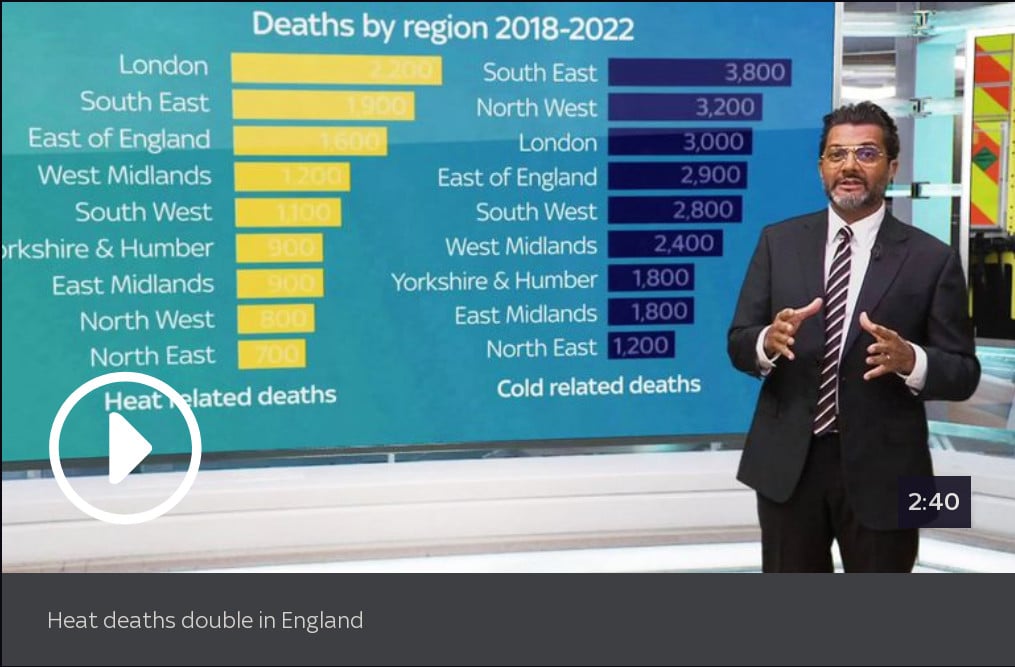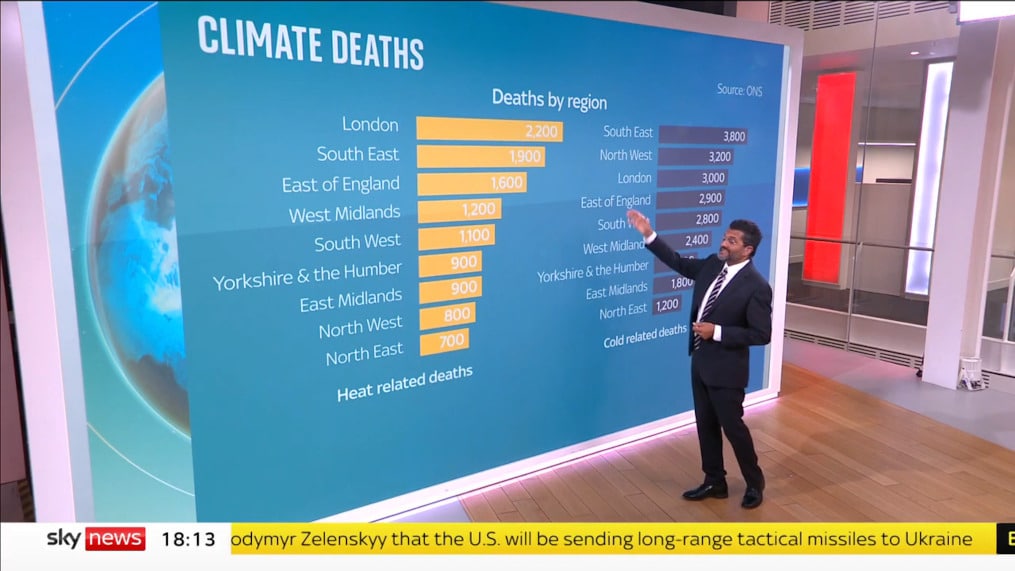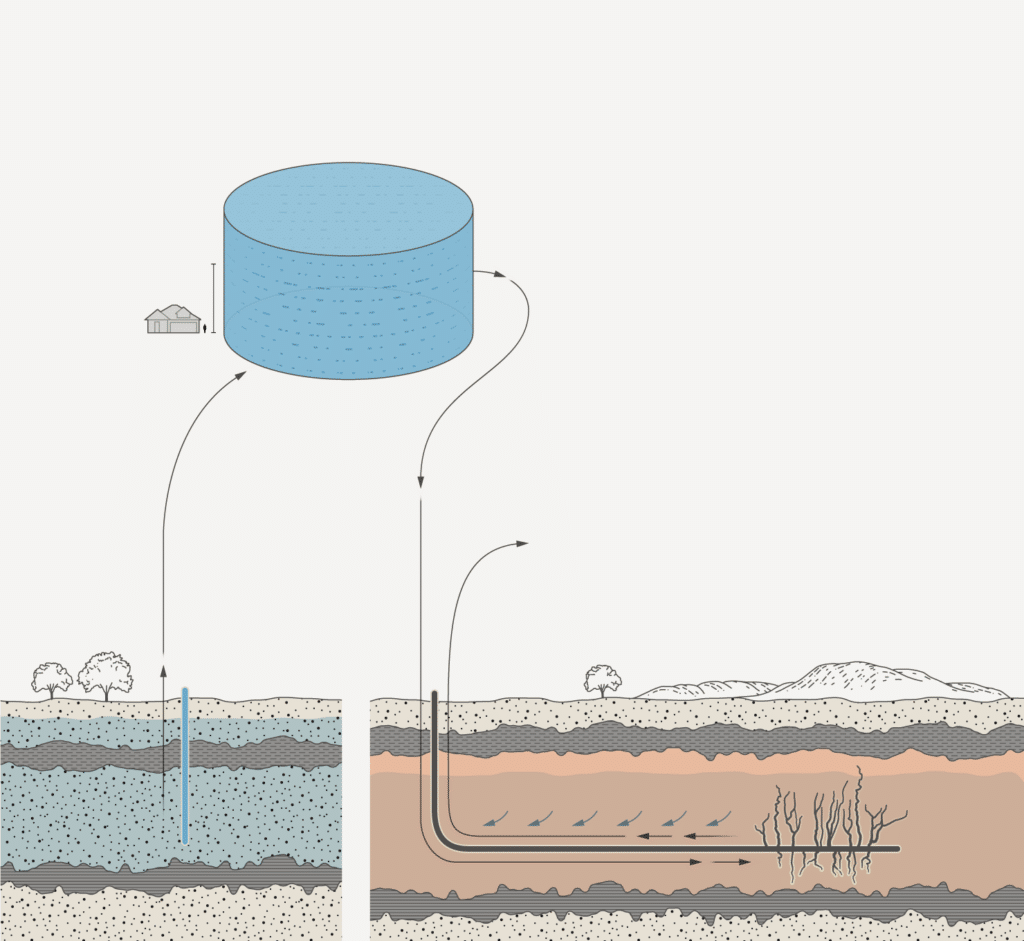The media, like the UN, whip up fear to convince people of the urgent need to dismantle capitalism.
While trying to enjoy a quiet day off, the media machine kept feeding me fear and sensationalism.
The New York Times, which really ought to know better, warned paying subscribers of ‘Monster Fracks’, that ‘require astonishing volumes of water to fracture bedrock’, and are threatening America’s fragile aquifers.
Hours later, Sky News piled on, saying ‘[e]xtreme global warming could eventually wipe out humans’, a warning produced by the ‘first-ever supercomputer climate models’.
It seems almost unfair to pick on South Africa’s own seething little cauldron of climate despair, the section of Daily Maverick that is prejudicially titled Our Burning Planet.
Despite having such an apocalyptically named section all to themselves, the virtue-signalling self-professed eco-socialists writing for it still whine about how downtrodden and neglected the climate beat is.
However, they wanted me to know that ‘[h]umanity has opened the gates to hell’, according to a UN chief, and also that there is a new book out by an economically illiterate historian, entitled Growth Growth Growth, that ‘[punctures] humanity’s hollow delusions in a New Age of Catastrophe’.
Growth
The Growth book, by retired Rhodes University history professor Julian Cobbing, is according to the reviewer, ‘a cyclonic tour of humanity’s rapacious and murderous relationship with itself’.
It argues that although technological development (like alphabets and clocks) resolved previous ‘crises linked to economic growth’, ‘the self-evident truth is that our current ultra-corporatised capitalist system is dependent on unchecked growth, while the resources that our economic system consumes are finite’, and ‘there is no technical solution to our current predicament’.
So, the history professor argues that although humanity has been able to achieve economic growth and growing prosperity throughout all of history, and has always found technological solutions to problems associated with resource scarcity, human ingenuity has recently, or soon will, vanish, and we’ll be toast. Nobody – among the planet’s 8 billion denizens – will have any idea what to do.
Cobbing’s book ‘[resonates] with Eric Hobsbawm’s Marxist historiography’, which does not surprise me at all.
Academics often indulge in Marxist fantasies, because they live in comfortable ivory towers on the taxpayer’s dime, never having to face the realities of the productive world outside their university walls. Why would they understand real-world economics?
Malthusian
The author obviously treads a well-worn Malthusian path armed with nothing but Marx for an economic crutch.
I have very often debunked the notion that degrowth is desirable, or that the physically finite nature of natural resources places limits on growth, so I’m not going to rehash that in detail here.
Suffice to say that growth is a function of far more than just physical resources. It is a function of using human ingenuity and capital to meet the wants and needs of society given limited resources.
Growth, or capitalism, does not depend on infinite resources. On the contrary, economics only exists because resources are scarce.
The more scarce a resource is, the higher its price. That signals to producers to produce more of it, and to consumers to consume less. If either of those is not possible, higher prices incentivise reducing, reusing and recycling (to borrow a phrase), or finding alternatives.
Growth reflects success at doing more with less.
It is the human factor that is, in practice, limitless, because we never stop learning. It is, in the words of economist Julian Simon, The Ultimate Resource. That book was written 42 years ago, which places it squarely within the remit of a history professor professing to write about Growth Growth Growth.
Hell
Even the most sycophantic of media praise singers have become disillusioned with Cyril Ramaphosa. They no longer believe him, and recognise that he puts party interests and socialist transformation above all else. They recognise he is either unable or unwilling to lift a finger to close the corruption taps, or close the government spending taps, which leaves the country rather embarrassed for cash.
Journalists no longer believe him, except when it’s about climate, when they quote him approvingly as if he is some sort of African Jesus.
It wouldn’t even cross the minds of these obsessive climate activists posing as journalists that Ramaphosa might be a cynical money-grubbing beggar on the world stage, exploiting the climate change narrative to moralise at the rich world about why it should give Africa tons of hard currency (‘equality and shared prosperity’).
The article quotes UN Secretary-General António Guterres, who reportedly said, ‘Humanity has opened the gates to hell. Horrendous heat is having horrendous effects.’
He cites as ‘evidence’ heatwaves, wildfires, droughts and floods, even though at least one of those is false, and the others trivially true but exaggerated.
On heatwaves, this study finds: ‘At least one extra heatwave day has occurred each decade over the majority of regions between 1950 and 2017.’ Shock, horror!
On wildfires, NASA finds: ‘…around 1900, global fire occurrence begins a rapid decline that continues until the present.’ (My italics. Guterres is simply lying.)
On droughts, this paper finds that their frequency, duration and severity has decreased in most of the northern hemisphere as well as South America, but increased in parts of the rest of the world.
On floods, this paper finds that they appear to have increased in both intensity and duration in the 21st century, although this was largely unrelated to global warming: ‘However, much of the trend in frequency and duration of the floods can be placed within the long-term climate variability context since the Atlantic Multidecadal Oscillation, North Atlantic Oscillation, and Pacific Decadal Oscillation were the main atmospheric teleconnections explaining this trend’.
Instead of pointing to extreme weather events, when the actual trends are weak at best and contradict his claims at worst, Guterres would do better to point out that despite a century’s worth of population growth, the number of global deaths due to natural disasters have declined by an astonishing 97.5% since the 1920s.
We have literally never had it so good.
‘Solutions’
In the same article, they quote the same guy, saying, ‘We can still build a world of clear air, green jobs, and affordable clean power for all.’
Either this is a lie, or his prior warning about the gates of hell, stated in the past tense, was false. He obviously doesn’t care to be precise, measured and deliberate in his language. All he cares about is to scare the pants off you, to convince you to sign on to the solutions the UN has to offer.
One of their solutions is to convince governments to spend trillions of dollars of taxpayer money on ‘climate mitigation’, which is cover for subsidising the green technology industry in which they’re all invested.
This, despite the fact that it will erode the prosperity that is the reason why those natural disaster deaths have declined so much, and that is essential for effective climate adaptation in future.
The broader solution they offer, however, is to dismantle capitalism and replace it with a control economy, or even world socialism.
As I have written before, Christina Figueres, former executive secretary of the UN Framework Convention on Climate Change and now the head of a climate action lobby group, once said: ‘This is probably the most difficult task we have ever given ourselves, which is to intentionally transform the economic development model, for the first time in human history.’
In 2016, Ottmar Edenhofer, former co-chair of the UN IPCC working group on Mitigation of Climate Change, said: ‘One has to free oneself from the illusion that international climate policy is environmental policy. This has almost nothing to do with the environmental policy anymore, with problems such as deforestation or the ozone hole. We redistribute de facto the world’s wealth by climate policy.’
Ramaphosa eagerly desires to be a recipient of that redistribution.
‘Wipe out humans’
The Sky News headline was pretty stark: ‘Extreme global warming could eventually wipe out humans, first-ever supercomputer climate models warn’.
And further: ‘Temperatures could spiral to 70C (158F) – transforming Earth into a “hostile environment devoid of food and water”, scientists warn – as the first ever supercomputer climate models are published, projecting a “very bleak distant future” for humanity.’
If you just scanned past the headlines and blurbs, as a majority of people do, you might have come away with renewed fear about the fate of humanity, and how man-made climate change is destroying the future for our children.
But that’s not what they were talking about. At all.
That headline is sensational, alarmist, apocalyptic, even, but it is the very definition of misleading.
The article refers to a paper published in Nature Geoscience, which models the tectonic future of our planet 250 million years into the future. By then, the continents will have merged into a new super-continent, Pangea Ultima, where temperatures could rise to an average of 70°C, which mammals could not survive.
Million. 250 million. I’ll be 250 000 052 years old when this catastrophe happens. This means in the entire 55-million-year history of mammals, we’re just over one sixth of the way there.
I will immediately make preparations. I do not intend to ‘expire’, to use the scientific genii’s term.
I intend to either live in a luxury bunker underground, with a lovely climate-controlled environment set at 22°C and grow lights to cultivate the shades of green in which I’d like to rest my eyes (to quote The Small Faces). Or, which is more probable given the time available to me for research and development, I’ll be long gone, to an unspoilt Goldilocks planet among the stars.
Heat deaths
To underscore Sky’s mendacity, they had a video in the middle of the story, about heat and cold deaths in England. How exactly this is relevant to the temperature of Pangea Ultima in 250 million short years from now, I have no idea, but here’s the thumbnail:

Note that you cannot read the numbers on the heat-related deaths side of the chart, but, judging by the bar lengths, one would suppose they are roughly in the same ballpark.
They are not. By peering very closely, or going almost two minutes into the video, you can make out the actual numbers.

The real numbers for yellow bars representing heat deaths are roughly half of what they appear to be, judging by the length of the blue bars. They’re on different scales, and those scales are designed to deceive.
In the video, they only point out in passing that cold deaths significantly outnumber heat deaths. They chart the trends in heat deaths on a scale of 0 to 5 000, and the trends in cold deaths on a scale of 0 to 20 000.
That the climate is ever so slightly warmer than in the past is actually a good thing, when it comes to deaths related to extreme temperatures. The UN climate expert they have in the video, however, says the exact opposite. He ignores the lower deaths due to cold, and focuses only on the increasing, but far more modest, numbers of deaths due to heat.
All of this is designed to mislead. It makes a delicious mockery of the link embedded halfway down the story: Why you can trust Sky News.
Monster fracks
And then we get to the Old Grey Lady. The Paper of Record. The New York Times.
Using their fancy image-and-text-scrolly-thing, they tell a story of modern oil and gas drilling in Texas. It’s paywalled behind a subscription that last I checked goes for $1 a month for the first year.
They credit the term ‘monster fracks’ to unnamed ‘researchers’, who I’ll bet work for environmental lobby groups.
The story laments the rising amount of water used to hydraulically fracture wells, using scary-big numbers like millions and trillions of gallons, which is a scary-big American unit of measure equivalent to about 16 eight-ounce water glasses, where an ounce is an Ancient Roman unit of measure equivalent to any of several different quantities of mass or volume.
In particular, they claim that ‘fracking’ used 1.5 trillion gallons of water since 2011. ‘That’s how much tap water the entire state of Texas uses in a year,’ they write, the ominous tone almost audible.
So that’s one year’s drinking water, versus 12 years of hydraulic fracturing. Conversely, drilling for oil and gas uses 8⅓% as much as Texans drink per year.
Doesn’t sound like very much, does it? But, you know, there’s a trend out there to drink a gallon of water per day, so I decided to look up Texas water use data.
They measure water use in acre-feet. I kid you not. An acre-foot is 325 851 gallons, of course, as any Texan fifth-grader can no doubt tell you. But you knew that.

See that purple line there? That’s the total amount of water used for all mining, including oil and gas drilling, in Texas. A rough calculation made by taking measurements from the image suggests it amounts to 1.4% of total Texas water use. By contrast, farming uses 57.4% of the available water.
Aquifers
The article also misleads readers about drilling for water to use in hydraulic fracturing, either out of ignorance, or out of a deliberate desire to deceive. Given the headline of the article, I’m going with deliberate deception.
Oil and gas companies drill for water alongside oil and gas, going 700 feet deep for it, according to the article. The only diagram they show for this is deeply deceptive:

This diagram suggests that the ‘groundwater’ sits at the same level as the shale rock from which oil and gas is produced. This is false. If shale were so permeable, they wouldn’t need to frack it. Acquifers sit above the shale, or below the shale, but not in the shale.
It also suggests that hydraulic fracturing as a matter of course pollutes groundwater, when that is not the case. It happens much deeper than water aquifers, where there is no groundwater.
They show, but don’t detail, the fact that a 700-foot well drilled to find water to frack with typically goes through the surface aquifers and into deep aquifers.
By contrast, municipal wells or agricultural irrigation wells rarely go deeper than 300 feet.
The article claims that those deep aquifers contain freshwater, but that is highly unlikely. Deep aquifers tend to contain brackish water full of salts and other leachates, and produce water that is unfit for any purpose other than hydraulic fracturing.
Water from deep aquifers can, over cycles of hundreds to thousands of years, reach the surface, but not before being filtered by several thousand metres of earth.
So, they use brackish water from very deep aquifers, that does not compete with drinking or irrigation water, and accounting for about 1.4% of the total water use of Texas.
Now, tell me again how scary the water use of those multi-million gallon ‘monster fracks’ is.
Conscious fear-mongering
Four examples, four cases of deliberate and conscious fear-mongering, in just one weekend.
The language used is extreme. They invoke death, destruction, catastrophe and apocalypse. Hell, even.
One article tried to convince me that economic growth, which has produced so much prosperity, and has brought the share of people living in extreme poverty down from 75% some two centuries ago, to below 10% today, is in fact, ‘humanity’s rapacious and murderous relationship with itself’.
Another tried to deceive me about extreme weather, and told me that ‘humanity has opened the gates to hell.’
Thus, the UN evokes the exact same fearful fantasy that religions have used for millennia to scare people into behaving.
One article tried to trick me into believing that a projection of climate for 250 million years hence was related to anthropogenic climate change, and that it was something for me to worry about.
I’ll start worrying about it in a few million years. Given that humanity took only a few thousand years from inventing writing to having digital computers in every pocket and flying to space for fun, I think that will give us plenty of time to adapt and invent a new future for ourselves.
And a final article tried to scare me about the terrible dangers of oil and gas drilling, which turned out, upon investigation, not to be so terrible after all.
Apocalyptic rhetoric, fear-mongering, and outright dishonesty are no way to get people to take you seriously. Both the UN and the media ought to learn to be far more honest, measured and accurate in their approach to climate or environmental issues.
The fear-mongering headlines, the constant red strobes and piercing sirens, are tiresome. We’re rapidly becoming habituated to the incessant clamour of the fear-mongers. I wouldn’t believe them if they told me water is wet.
The views of the writer are not necessarily the views of the Daily Friend or the IRR
If you like what you have just read, support the Daily Friend

